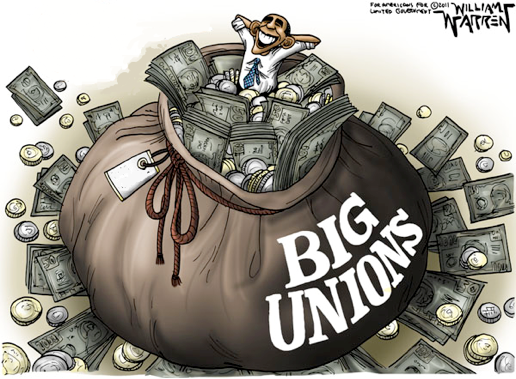Labor unions once again spent heavily during the 2018 election cycle, contributing nearly $135 million; unsurprisingly, the overwhelming majority of union political spending was to help Democrats, liberal causes, and liberal organizations. In other words, many unions again ignored the fact that about 40 percent of union household members, including many union members, vote Republican.
Overall, Democrat candidates and organizations collected more than five times as much money from unions as Republicans and Republican organizations did, according to data from the Center for Responsive Politics. Of the top 20 recipients of labor money, 18 were Democrats. The top five recipients of political contributions from unions were the following:
- Sen. Claire McCaskill (D-MO) was unions’ favorite candidate of the cycle; she received over $370,000 from unions.
- Sen. Sherrod Brown (D-OH) also received over $370,000 from unions.
- Rep. Conor Lamb (D-PA) received over $310,000 from unions. The labor sector was his fifth largest source of campaign contributions.
- Sen. Joe Donnelly (D-IN) also received over $310,000 from unions.
- Matt Cartwright (D-PA) received nearly $310,000 from unions. The labor sector was his third largest source of campaign contributions.
While these five labor union favorites received especially strong financial support, run-of-the-mill Democrats also received significantly more union support than their Republican counterparts. For example, the average House Democrat received contributions of more than $130,000 from unions, and the average Senate Democrat received contributions of more than $115,000 from unions. Meanwhile, the average House Republican received contributions of less than $35,000 from unions. Senate Republicans fared even worse: the average Senate Republican received contributions of a little more than $10,000 from unions.
The five unions that spent the most on political contributions during the 2018 cycle were the following:
- The Carpenters and Joiners Union made political contributions of more than $17.7 million. Nearly 80 percent of the union’s contributions to candidates and parties went to Democrats, and 100 percent of its contributions to outside spending groups went to liberal organizations.
- The National Education Association (NEA) made contributions of nearly $17.4 million. Over 87 percent of the NEA’s contributions to candidates and parties went to Democrats, and 100 percent of its contributions to outside spending groups went to liberal organizations.
- The American Federation of State, County and Municipal Employees (AFSCME) made contributions of more than $11.5 million. Nearly 99 percent of AFSCME’s contributions to candidates and parties went to Democrats, and 100 percent of its contributions to outside spending groups went to liberal organizations.
- The American Federation of Teachers (AFT) made contributions of more than $9.1 million. Nearly 99 percent of the AFT’s contributions to candidates and parties also went to Democrats, and 100 percent of its contributions to outside spending groups went to liberal organizations.
- The Laborers Union made contributions of more than $8.5 million. Over 79 percent of the union’s contributions to candidates and parties also went to Democrats, and over 99 percent of its contributions to outside spending groups went to liberal organizations.
Of the 20 unions with the largest political expenditures, only two made any serious efforts to be bipartisan in their contributions: the National Air Traffic Controllers Association and the Air Line Pilots Association. Those two unions both gave more than 40 percent of their total political contributions to Republicans.
For years, unions have disrespected the views of many of their members to fund Democrats and liberal causes, and they continue to do so. In the future, perhaps the Janus decision will lead to changes in the causes and candidates that public sector unions support. Either way, there is a need for more union activists to take over their unions, in both the public and the private sector, and make them more responsive to their members; and there is a need for more Right to Work legislation to allow all workers to stop funding organizations and viewpoints they oppose.
Richard McCarty is the Director of Research at Americans for Limited Government Foundation.








